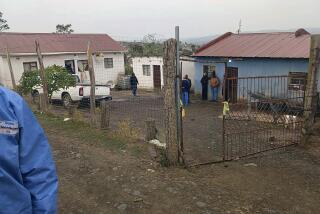4 Guerrilla Suspects Dead in Gun Battle, S. Africa Says
JOHANNESBURG, South Africa — Police fought a gun battle with suspected African National Congress guerrillas near South Africa’s border with Botswana and killed four in the most serious clash in many months between the insurgents and the security forces, the government announced Saturday.
Five more blacks died elsewhere in the country’s continuing political violence, and a bomb exploded Saturday in a busy shopping center at Queenstown in eastern Cape province, wounding two whites.
Two top black union leaders were arrested and are being held without charge under the 2 1/2-week-old state of emergency. Their detentions, following earlier arrests of labor leaders, could bring further protest strikes this week by workers seeking their release.
Word of the labor leaders’ arrests spread quickly Saturday, but they may not be identified in news articles because emergency regulations prohibit disclosure of their names.
Editor Detained
The government, however, did confirm that it had detained Zwelakhe Sisulu, 36, editor of the Roman Catholic newspaper New Nation, after reports that he had been abducted Thursday night by four masked white men who refused to identify themselves.
It was the first detention the government has confirmed since the state of emergency was declared on June 12. Louis le Grange, the minister of law and order, rejected allegations that South Africa is “going down the road of death squads” with unexplained abductions.
Sisulu is the son of Walter Sisulu, an imprisoned leader of the African National Congress, and of Albertina Sisulu, president of the United Democratic Front coalition of anti-apartheid groups. He has emerged as a key figure himself in recent political developments.
The nine deaths reported Saturday brought to 81 the number of people killed, according to the government’s figures, since the state of emergency was imposed by presidential decree. President Pieter W. Botha’s government contends that emergency rule, which gives the police and army virtual martial-law powers, has reduced the level of violence countrywide.
Bombings, Rebel Attacks
The government is faced with a bombing campaign in several cities, including Durban and Johannesburg, and with increased attacks by African National Congress insurgents, who last week assassinated a top black police officer and planted a land mine on a road less than 20 miles from the seat of government in central Pretoria.
The Queenstown bomb, left in a trash bin, exploded in the middle of the Saturday morning shopping, seriously wounding a 12-year-old white boy and slightly injuring a white man who was cut by flying glass, the government’s information bureau said. It was the third weekend bombing in a row.
Police, on the alert because of recent such attacks, had established a roadblock Friday night near the border with Botswana, the information bureau said. South Africa says the African National Congress uses Botswana for transit and as a rear base for its activities inside South Africa.
When police at the roadblock stopped a pickup truck carrying congress guerrillas, the guerrillas hurled hand grenades and opened fire with AK-47 rifles, according to the government information bureau. Police returned the fire, killing four insurgents.
2 Stoned to Death
Two men were stoned to death in Soweto early Saturday, according to the government information bureau, in what appeared to be continued political feuding by rival political groups there. The charred bodies of two men who had been stoned and then set alight were found in the troubled Kwandebele tribal homeland northeast of Pretoria.
A black person wounded when police fired on a mob they said had attacked them with firebombs near Worcester, north of Cape Town, died on Saturday, according to the government information bureau.
The bureau is now the only authorized source of news on the country’s continuing civil strife and the state of emergency. Stringent government regulations prohibit reporters from entering many black areas, from firsthand reporting of any unrest or any security force actions and from quoting “subversive statements” by opposition leaders. Newsmen are thus compelled to accept unverified government accounts of the political unrest here.
Black Unionist Held
One of the two detained black labor leaders is a key official of the National Union of Mineworkers, the country’s largest union, which is in the midst of its annual industrywide wage negotiations and which has the power to cripple the South African economy if it goes on strike. He was arrested Friday afternoon when he returned to his home at a gold mine southwest of Johannesburg, union sources said.
The other union official is one of the chief organizers of the militant Metal and Allied Workers Union. He was detained Saturday on his return from a visit to Europe, according to an opposition member of Parliament who was present.
Both men also hold prominent positions in the Congress of South African Trade Unions, the 550,000-member multiracial union federation, which is preparing to challenge the government with a public meeting here Tuesday on the state of emergency and its impact on the labor movement.
The Labor Monitoring Group, an independent organization of academic labor specialists, reported Saturday that about 920 trade unionists are being held in detention.
More to Read
Sign up for Essential California
The most important California stories and recommendations in your inbox every morning.
You may occasionally receive promotional content from the Los Angeles Times.










